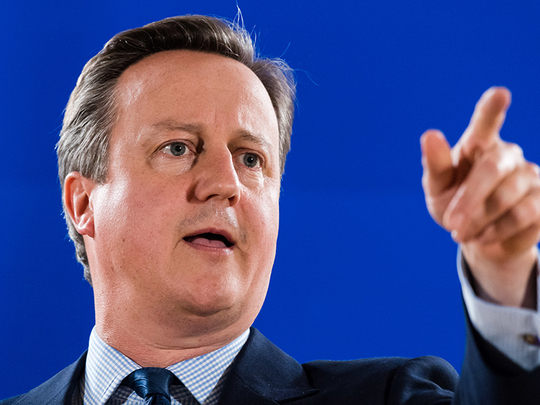
Ah politics. You gotta love it. The academic definition would likely describe it as the art of bringing about the possible, whereas as the pragmatic one would be of bringing about the probable and benefiting as much as you can in the process. A little cynical, perhaps. But don’t forget that ‘optics’ is an anagram contained in the letters that make up the world ‘politics’ — which likely explains when optics seems so blurred when it comes to political dealings.
The reality is that lobbying plays a huge role in making things happen. Doors are opened to those with contacts, and nothing quite compares to the black book of a former Prime Minister of the United Kingdom — specifically David Cameron.
The former Conservative party leader is embroiled in a scandal that has shaken confidence in the government of Boris Johnson and has created over the past two weeks a lingering impression that his is an administration that has played fast and loose with lobbying rules, granting access and favours to the former PM and others — whereas ordinary folk without such connections have difficulty in getting a council to fill a pothole.
Cameron has been accused of using his personal connection to the Chancellor of the Exchequer, Rishi Sunak, to try to secure government funds to prevent a financial services company he worked for from collapsing during the pandemic. What’s more, text messages released by Sunak — the man in the second-most powerful political post at 11 Downing Street in the UK and with one eye firmly focuses on the move next door — suggest that the two have a very comfortable relationship, which might not be all surprising given that Sunak was first elected in 2015. That was the year before the ill-judged Brexit referendum scuttled Cameron’s leadership and eventually handed Johnson the keys to No 10.
Cameron worked at Greensill Capital, a small investment bank that was in the habit of lending large sums to a British steelmaker, owned by Indian tycoon Sanjeev Gupta, on the basis of future invoices. It’s called supply-chain financing, helping companies get paid sooner on the basis of short-term loans. It ran into trouble and, seeing as its troubles came about by helping a steel company — key British industry and key skilled jobs and all of that — the former PM made the case over texts and drinks with cabinet ministers, that it should get preferential treatment.
As things stand now, there is nothing illegal in Cameron’s actions — lobbying is allowed by former ministers once they have been out of office for more than two years — and he has been gone five.
Greensill did not ultimately receive the loan from the Covid Corporate Financing Facility that Cameron was requesting, but it did receive funds from a different support scheme called the Coronavirus Large Business Interruption Loan Scheme.
What makes the optics look bad in this case is that there are a lot of companies up and down the UK who have been struggling because of coronavirus. And Brexit too — but let’s give Cameron the benefit of the doubt on that. Just because he was unpopular, held a referendum and messed up the Remain campaign doesn’t make him solely responsible for the financial effects of leaving the European Union.
Lex Greensill, an Australian entrepreneur and financier who made his money on financial derivatives, was well connected within the staid corridors of power in Whitehall — so much so that the opposition Labour party has been quick to point out his business card included a Downing Street contact address.
The affair has been sitting around parliament for two weeks now, so much so that government MPs have been forced to stick by party lines in voting down an inquiry motions. That, however, hasn’t stopped various parliamentary committees saying they will look at lobbying and the specifics of this case. That in itself will be embarrassing, given that Cameron, Sunak and others will be grilled in person over who did what, knew what and knew when.
Cameron has been forced to issue a lengthy statement confirming that he messaged Sunak about rescuing the firm, that Greensill had a job in Downing Street during his time as PM, confirming that he worked 25 days a year for the bank and, bizarrely, admitting to going on a trip to Saudi Arabia with Greensill in 2020 to lay the groundwork for a G20 meeting.
Perhaps more problematically, Cameron also admitted that he’d lobbied numerous others to discuss using Greensill contracts for the National Health Service (NHS).
If the Cameron case wasn’t bad enough, theirs is also an admission by Matt Hancock, the UK’s Secretary for Health, that he had a previously underreported involvement in a company owned by his sister that was a supplier of personal protective equipment to the NHS. For months now there have been stories in the media of some of Hancock’s friends receiving PPE supplier contracts, or vast sums of cash being paid out for substandard PPE.
In part, some of the confusion over contracts for PPE can be forgiven when one considers that many millions of pieces of gloves, masks, gowns and other PPE were rapidly needed as the pandemic took hold. But now that the pandemic is gradually coming to an end, questions are being asked about who made what, how much they were paid, and were the guidelines followed.
Whether the scandal will have any effect on voters in the long-term is hard to determine. In many ways, an element of this grubbiness is part and parcel of how things get done. That’s largely a fact of life. It’s business as usual. It’s just that the optics look bad …








